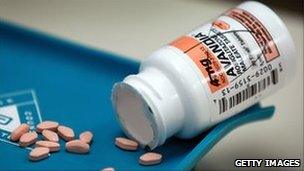Q&A: Avandia
- Published
European Medicines Agency experts have said Avandia, a leading diabetes drug, should be suspended from the market.
But what is the drug and why has it proved so controversial?

GlaxoSmithKline is the world's third largest pharmaceutical company
What is Avandia?
The drug - given in tablet form - is a treatment for type 2 diabetes, which is often associated with obesity.
Avandia is one of a number of treatments used when patients have struggled to get their condition under control through changes to their lifestyles, such as improving their diet and levels of physical activity.
It tends to be used as a second-line treament after a drug called metformin.
The tablets - given in two doses a day - work by helping to lower blood sugar levels by increasing the sensitivity of liver, fat and muscle cells to insulin. This enables these cells to remove sugar from the blood more effectively.
The generic name for the drug is rosiglitazone. It is also used in two other diabetes treatments - Avandamet and Avaglim, both of which combine the rosiglitazone with other drugs.
In total, there are 109,000 patients using the drug in the UK and 2m worldwide.
Why is there concerns?
Avandia has been linked to a raised risk of heart attacks and heart failure. When it was approved by the European medicines regulator in 2000 it included warnings for patients with heart failure and since then these have been expanded to include other heart problems.
This is not unusual for a drug. There are always benefits and risks to be taken into account, meaning for some patients a treatment may not be appropriate.
And despite the increasing reports of problems the regulator - the European Medicines Agency (EMA) - concluded in 2008 that the drug still had a "small, if diminishing" place in diabetes treatment.
But many experts have argued this does not go far enough, and that the drug should be withdrawn completely.
Earlier this month, clinical pharmacologist Dr Yoon Loke, from the University of East Anglia, told the BBC his analysis showed that the drug doubles the risk of heart failure, regardless of whether or not the patients were considered at high risk before they took the drug.
He has calculated that annually UK patients could suffer "about 1,000 extra heart attacks and possibly 600 extra cases of heart failure as a result of using Avandia".
What does the manufacturer say?
GlaxoSmithKline has always maintained that patient safety is its first priority, rejecting suggestions people have been put at risk.
Officials have said that an "extensive" research programme has been carried out involving more than 50,000 patients to analyse the safety and benefits of the drug.
The data from these trials, the manufacturer said, does not show an increase in the overall risk of heart problems.
But the debate has also raised wider questions about the behaviour of the pharmaceutical giant.
GSK has also been forced to defend itself over allegations that it hid negative data regarding Avandia.
What have regulators said before?
Experts at the Medicines and Healthcare products Regulatory Agency (MHRA), the UK drugs regulator, advised three moths ago that it should be withdrawn, the BBC's Panorama reported in September.
But this recommendation was not made public. Instead letters were sent to health care professionals asking them to "consider alternative treatments where appropriate".
The MHRA has suggested that it was not right to act on its own as its decision could be over-ruled in Europe.
Instead, it has been left advisers for the EMA to make its verdict.
This comes after experts in the US voted to keep it on the market with more restrictions.
However, the decision was not unanimous with some saying it should be taken off the market.
What happens now?
The EMA advice is passed on to the European Commission for an official ruling. This could take several months.
However, it would be extremely unusual for the experts advice to be ignored. Only once or twice in the past 15 years has this happened.
Interestingly, the recommendation does leave the door ajar for GSK.
The advice is for a suspension rather than withdrawl, which means the manufacturer can get it lifted if they present convincing data that for some patients it will work.
What should patients do in the meantime?
Regulators and patient groups are clear - consult a doctor.
They say under no circumstances should patients stop taking the drugs themselves. Instead, when they talk to a doctor they can discuss alternative treatments.
Avandia is one of a group of drugs which can be used for type 2 diabetes.
- Published6 September 2010
- Published21 July 2010